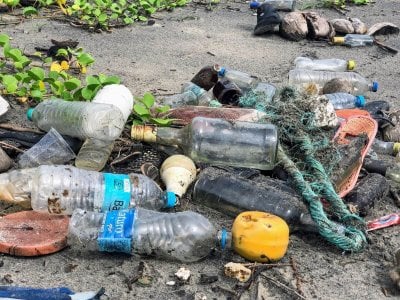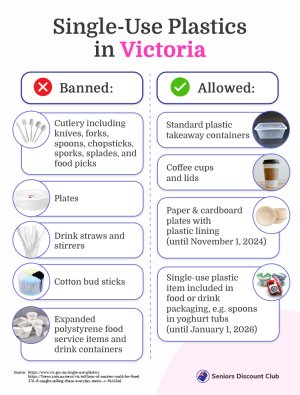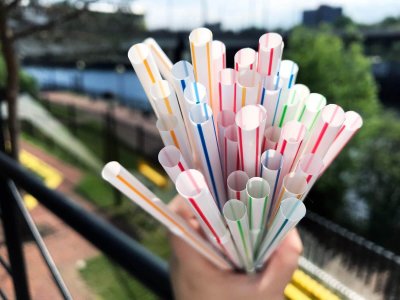Millions of Aussies could be fined $370 for selling these everyday items — take note!
- Replies 14
In November of last year, the NSW government banned the widespread sale of single-use plastic items in an effort to minimise the massive amounts of waste discarded in landfills.
Now, the Victoria state government has officially followed suit with individual violators in for a hefty $370 fine if caught selling or supplying items covered by the ban. Ouch.
Businesses found doing the same, meanwhile, face up to $1849 in penalties.
What is covered by the ban?
The following single-use plastic products are covered:
‘Compostable plastic items can harm wildlife the same way conventional plastic items do if they are littered. Many compostable plastics require processing at a specialised compost facility in order to break down,’ they said.
Standard plastic containers and coffee cups and lids are not included in the ban because as of yet, there aren’t any good alternatives, according to reports.

Are there any exemptions?
Victoria has also set other exemptions to the ban ‘where suitable alternatives… are not currently available’.
For example, people with medical disabilities (such as those that impair movement) are allowed to use single-use plastic straws.
Cotton buds are also permitted for use in medical, forensic, and scientific purposes.
Correctional and mental health facilities are also allowed to use plastic cutlery ‘where required’.
Meanwhile, other single-use plastic items have exemptions with set end dates.
Plastic-lined paper or cardboard plates are exempt from the ban until November 1, 2024, while any single-use item integrated into food packaging (e.g. plastic spoons in yoghurt tubs) are allowed until January 1, 2026.
With the development expected to increase demand for reusable alternatives, the Victorian government reminds businesses and organisations that sell and supply the items to make sure that they can be used multiple times and come with written representation from the manufacturer ‘that they are designed to last at least one year’.
What if I have unused stock of the banned items lying around?
There will be no considerations given to those with existing spare stock of items covered by the ban.
‘Banned items cannot be sold or supplied, regardless of if they were purchased before the ban commenced on 1 February 2023,’ the state government said.
It is advised that those with an excess of the banned items contact their suppliers to check if arrangements such as exchanges or credit could be made. Local recyclers may also be contacted to see if they accept bulk quantities.

Why did Victoria ban these single-use plastic items?
The state government says single-use plastics make up a third of litter seen in the environment, though it is unclear if this applies to only the state or the entirety of Australia.
These items are also resource-heavy in the sense that they take time and money to clean up and produce. In addition, single-use plastics also harm wildlife and contaminate food and water.
Lastly, Victoria also pointed out a practical aspect of the ban: ‘single-use plastics can often be easily avoided or replaced with reusable products’.
On that note, it is also advised to favour alternatives in cases where single-use items cannot be avoided.
‘Consider items made from non-plastic materials such as responsibly sourced paper, wood, or bamboo,’ the state government said.

Playing catch-up?
Despite welcoming the ban, some experts say states like Victoria and NSW still have a lot of ground to cover especially compared to their counterparts.
‘If you compare their ban to other states like WA, South Australia, Queensland, they moved some time ago and they are now working on a second (round) of items,’ Boomerang Alliance Director Jeff Angel told ABC.
‘There will be calls for New South Wales and Victoria to catch up…’
According to the Australian Marine Conservation Society, WA, SA, and Queensland, all moved to ban single-use plastics in 2021.
The three states are expected to expand their bans this year to include plastic items like heavyweight bags.
‘Our submissions to the government said they should include more items … such as heavyweight plastic bags, coffee cups, some of the other plastic packaging. But it's important we start,’ Angel added.
NT meanwhile will move to replicate the ban by 2025 as part of its five-year Circular Economy Strategy.
Tasmania remains the only state with no commitments to ban single-use plastics according to the marine advocacy group. It should be noted however that the Hobart City Council passed a by-law in 2020 that banned the use of single-use plastics in takeaway food packaging and similar products.
The state’s Greens were also reported in October of last year to be pushing for a similar bill in the Tasmanian Parliament.

For what it’s worth, and if you’re one of the environmental persuasion, at least, this development from Victoria is a step in the right direction for a more sustainable Australia.
After all, Victoria is second only to NSW in terms of population size, with an estimated 6.7 million Aussies calling it home as of 2022.
It couldn’t come at a better time too, considering what happened to supermarket recycling partner REDCycle last year which had many Aussies asking where they will put their recyclables in the meantime.
 On another note, with the tides of consumer packaging shifting away from single-use plastics, an Aussie start-up may have a solution to what alternatives might be suitable — and it uses mushrooms!
On another note, with the tides of consumer packaging shifting away from single-use plastics, an Aussie start-up may have a solution to what alternatives might be suitable — and it uses mushrooms!
So, what do you think of Victoria’s ban on single-use plastics? Is it something you agree with? Or do you think such a move will only cause inconvenience to many Australians?
Tell us your thoughts below!
Now, the Victoria state government has officially followed suit with individual violators in for a hefty $370 fine if caught selling or supplying items covered by the ban. Ouch.
Businesses found doing the same, meanwhile, face up to $1849 in penalties.
What is covered by the ban?
The following single-use plastic products are covered:
- Drinking straws
- Cutlery
- Plates
- Drink stirrers
- Cotton bud sticks
- Expanded polystyrene food and drink containers
‘Compostable plastic items can harm wildlife the same way conventional plastic items do if they are littered. Many compostable plastics require processing at a specialised compost facility in order to break down,’ they said.
Standard plastic containers and coffee cups and lids are not included in the ban because as of yet, there aren’t any good alternatives, according to reports.

It is estimated that Australia produces around 2.5 million tonnes of plastic waste annually. Image Credit: Unsplash/john_cameron
Are there any exemptions?
Victoria has also set other exemptions to the ban ‘where suitable alternatives… are not currently available’.
For example, people with medical disabilities (such as those that impair movement) are allowed to use single-use plastic straws.
Cotton buds are also permitted for use in medical, forensic, and scientific purposes.
Correctional and mental health facilities are also allowed to use plastic cutlery ‘where required’.
Meanwhile, other single-use plastic items have exemptions with set end dates.
Plastic-lined paper or cardboard plates are exempt from the ban until November 1, 2024, while any single-use item integrated into food packaging (e.g. plastic spoons in yoghurt tubs) are allowed until January 1, 2026.
With the development expected to increase demand for reusable alternatives, the Victorian government reminds businesses and organisations that sell and supply the items to make sure that they can be used multiple times and come with written representation from the manufacturer ‘that they are designed to last at least one year’.
What if I have unused stock of the banned items lying around?
There will be no considerations given to those with existing spare stock of items covered by the ban.
‘Banned items cannot be sold or supplied, regardless of if they were purchased before the ban commenced on 1 February 2023,’ the state government said.
It is advised that those with an excess of the banned items contact their suppliers to check if arrangements such as exchanges or credit could be made. Local recyclers may also be contacted to see if they accept bulk quantities.

Aussies found selling or distributing prohibited single-use plastic items can cop fees of up to $370. Image Credit: Seniors Discount Club
Why did Victoria ban these single-use plastic items?
The state government says single-use plastics make up a third of litter seen in the environment, though it is unclear if this applies to only the state or the entirety of Australia.
These items are also resource-heavy in the sense that they take time and money to clean up and produce. In addition, single-use plastics also harm wildlife and contaminate food and water.
Lastly, Victoria also pointed out a practical aspect of the ban: ‘single-use plastics can often be easily avoided or replaced with reusable products’.
On that note, it is also advised to favour alternatives in cases where single-use items cannot be avoided.
‘Consider items made from non-plastic materials such as responsibly sourced paper, wood, or bamboo,’ the state government said.

The use of certain single-use plastic items is allowed by Victoria in select cases. Image Credit: flickr
Playing catch-up?
Despite welcoming the ban, some experts say states like Victoria and NSW still have a lot of ground to cover especially compared to their counterparts.
‘If you compare their ban to other states like WA, South Australia, Queensland, they moved some time ago and they are now working on a second (round) of items,’ Boomerang Alliance Director Jeff Angel told ABC.
‘There will be calls for New South Wales and Victoria to catch up…’
According to the Australian Marine Conservation Society, WA, SA, and Queensland, all moved to ban single-use plastics in 2021.
The three states are expected to expand their bans this year to include plastic items like heavyweight bags.
‘Our submissions to the government said they should include more items … such as heavyweight plastic bags, coffee cups, some of the other plastic packaging. But it's important we start,’ Angel added.
NT meanwhile will move to replicate the ban by 2025 as part of its five-year Circular Economy Strategy.
Tasmania remains the only state with no commitments to ban single-use plastics according to the marine advocacy group. It should be noted however that the Hobart City Council passed a by-law in 2020 that banned the use of single-use plastics in takeaway food packaging and similar products.
The state’s Greens were also reported in October of last year to be pushing for a similar bill in the Tasmanian Parliament.
Key Takeaways
- Plastic straws, plates, cutlery and drink stirrers are now banned in Victoria.
- Individuals who sell, distribute or supply banned items can be fined $370, while businesses face a penalty of $1849.
- Certain exceptions are allowed under the ban, such as using single-use plastics on medical grounds.
- The ban also covers all single-use plastic items regardless of the date of purchase.
- Despite the policy, some experts point out that Victoria still has a long way to go in terms of acting against single-plastic use.
After all, Victoria is second only to NSW in terms of population size, with an estimated 6.7 million Aussies calling it home as of 2022.
It couldn’t come at a better time too, considering what happened to supermarket recycling partner REDCycle last year which had many Aussies asking where they will put their recyclables in the meantime.
Tip
Got questions about Victoria’s single-use plastic ban? Reach their website here for more details!
So, what do you think of Victoria’s ban on single-use plastics? Is it something you agree with? Or do you think such a move will only cause inconvenience to many Australians?
Tell us your thoughts below!







